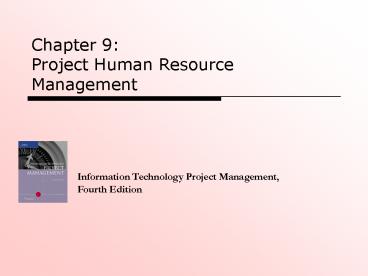Chapter 9: Project Human Resource Management - PowerPoint PPT Presentation
1 / 15
Title:
Chapter 9: Project Human Resource Management
Description:
The main goal of team development is to help people work together more ... 100 percent: INFP, ISFP, ESFP, ISTP. 50 percent: ENFP, ESTP ... – PowerPoint PPT presentation
Number of Views:172
Avg rating:3.0/5.0
Title: Chapter 9: Project Human Resource Management
1
Chapter 9Project Human Resource Management
Information Technology Project Management,Fourth
Edition
2
Developing the Project Team
- The main goal of team development is to help
people work together more effectively to improve
project performance. - It takes teamwork to successfully complete most
projects.
3
Tuckman Model of Team Development
- Forming
- Storming
- Norming
- Performing
- Adjourning
4
Training
- Training can help people understand themselves
and each other, and understand how to work better
in teams. - Team building activities include
- Physical challenges
- Psychological preference indicator tools
5
Myers-Briggs Type Indicator (MBTI)
- MBTI is a popular tool for determining
personality preferences and helping teammates
understand each other. - Four dimensions include
- Extrovert/Introvert (E/I)
- Sensation/Intuition (S/N)
- Thinking/Feeling (T/F)
- Judgment/Perception (J/P)
- NTs, or rationals, are attracted to technology
fields. - IT people vary most from the general population
in their tendency to not be extroverted or
sensing.
6
Wideman and Shenhars Views on MBTIand Project
Management
- Most suited for project leadership
- 100 percent INTJ, ENTJ, ISTJ, ESTJ
- 50 percent INTP, ENTP, ENFP, ENFJ
- Best suited as followers
- 100 percent INFJ, ISFJ
- 50 percent INTP, ENTP, ENFP, ENFJ, ESFJ
- Not suited for project work
- 100 percent INFP, ISFP, ESFP, ISTP
- 50 percent ENFP, ESTP
Wideman, R. Max and Aaron J. Shenhar,
Professional and Personal Development A
Practical Approach to Education and Training,
Project Management for Business Professionals,
edited by Joan Knutson, 2001, p. 375.
7
MBTI and Suitability to Project Work
What do you think about these views?
Wideman, R. Max. Project Teamwork, Personality
Profiles and the Population at Large Do wehave
enough of the right kind of people?
(http//www.maxwideman.com/papers/profiles/profile
s.pdf ).
8
Social Styles Profile
- People are perceived as behaving primarily in one
of four zones, based on their assertiveness and
responsiveness - Drivers
- Expressives
- Analyticals
- Amiables
- People on opposite corners (drivers and amiables,
analyticals and expressives) may have difficulty
getting along.
9
Figure 9-9. Social Styles
10
Reward and Recognition Systems
- Team-based reward and recognition systems can
promote teamwork. - Focus on rewarding teams for achieving specific
goals. - Allow time for team members to mentor and help
each other to meet project goals and develop
human resources.
11
Managing the Project Team
- Project managers must lead their teams in
performing various project activities. - After assessing team performance and related
information, the project manager must decide - If changes should be requested to the project.
- If corrective or preventive actions should be
recommended. - If updates are needed to the project management
plan or organizational process assets.
12
Tools and Techniques for Managing Project Teams
- Observation and conversation
- Project performance appraisals
- Conflict management
- Issue logs
13
General Advice on Teams
- Be patient and kind with your team.
- Fix the problem instead of blaming people.
- Establish regular, effective meetings.
- Allow time for teams to go through the basic
team-building stages. - Limit the size of work teams to three to seven
members.
14
General Advice on Teams (contd)
- Plan some social activities to help project team
members and other stakeholders get to know each
other better. - Stress team identity.
- Nurture team members and encourage them to help
each other. - Take additional actions to work with virtual team
members.
15
Quote of the Day
- If you don't attack the risks, the risks will
attack you.































